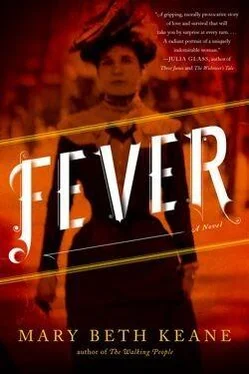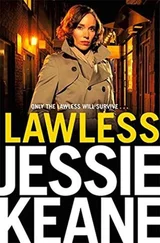Of all the women he’d ever encountered in his life, Francis O’Neill decided that Mary Mallon was the hardest to read. Last time he’d come to see her, just before Christmas, he told her that there was hope for her case, more hope than ever before. A new health commissioner was to be installed early in 1910, and he’d already gone on record with his sympathy for Mary’s plight. “It’s likely he’ll release you once he takes office,” Mr. O’Neill told Mary. He imagined this would be a Christmas gift to her, a baton of hope that she could carry through the holidays, but the news didn’t seem to register at all. A few of the doctors at the hospital mentioned that she seemed to have mellowed since the summer. Where she’d always seemed to take great pains to appear neat and presentable, to tell Mr. O’Neill her opinion on all matters, related to her case or not, she now seemed subdued, worn down. Her hair was unclean and falling out of her bun. Her collar drooped. Her lips were so chapped that he could see where they’d cracked, and bled, and dried, and broken open again.
“I guess we’ll see,” was all Mary said then, and instead seemed more interested in the food he’d brought for her, all wrapped in parcel packages like Christmas presents. Smoked ham, cheese, candied walnuts, chocolate-covered cherries, Christmas cookies. She opened the walnuts for them to share during that meeting, but he didn’t want to put his fingers in the box where her fingers had been, so he told her that walnuts didn’t agree with his stomach. “Shall I open the cherries?” But he said no, he’d eaten just before leaving the city, and she’d leveled a look at him as if to say she’d heard that one before.
Back then, he’d attributed her mood to the general lowness some people feel around Christmas, and reminded himself that it was hard enough to be alone at the holidays, and even harder for her. But now, on a fine February day with every promise of spring in the air, he’d come to see her with more news, and she didn’t seem any more interested than before.
“Health Commissioner Lederle has been installed,” he said once they were seated.
“Who?”
“The new commissioner I mentioned when we last met.”
“Yes. Yes, of course.”
“And one of the things we’ve been talking about — not just he and I but many medical people — is how many carriers there are, Mary. It’s become clear now that there must be hundreds of them. Thousands. Your case is not so special after all, and that’s a good thing.”
Mary frowned and picked at a splinter of wood in the tabletop.
“Mary”—he waited until she looked at him—“he’s decided to release you. The paperwork has already gone through. You will be off this island and back home by the end of the week.”
He brought her a present to go with the news. It was his wife’s idea, and when he agreed, she’d gone straight out to get for Mary, whom she’d never met, something colorful and beautiful, something any woman would be proud to wear. “Men don’t understand about having nice things to wear,” she said, and he told her to go to the same shops she visited, spend the same as she would spend on herself. He took it out now, and pushed it across the table toward her. She laid the package on her lap, but only played with the string.
“What do you mean about my case being not so special? That means they still believe I gave the fever to all those people.”
“Well… yes.”
They’d been on this case together long enough to be frank. She was every bit as intelligent as she insisted she was. “It is true, you know,” he said. “You are a carrier. It’s difficult to accept, but you must have had time to think about it over these three years. The point is that it’s not your fault.”
“But I cooked for so many people who never got sick. I cooked for hundreds of people over the years. And only twenty-three, I don’t—”
“That’s part of it, too. The way it comes and goes. And some people are immune. That’s one of the reasons they’ve kept you here, to study your patterns, but it’s not your responsibility to provide them with the data they need, and Lederle agrees. They can’t lock up everyone who carries the fever. The best alternative right now is to let you go on the condition that you will never cook for hire again. You are no harm to anyone unless you are cooking.”
Mary sighed. Of course. It was what he’d been urging her to volunteer since the very beginning, to quit cooking, to give up one life and sign on for another.
“The commissioner has objected to your confinement since day one, and through his own contacts he’s already gotten you work at a laundry. It’s on Washington Place, right by the park.”
Mary did a few quick calculations in her head. She’d have to stay in a boardinghouse at first, and then she’d have to get a room to share. A laundry. A laundress. Time was moving backward.
“And you’ll have to check in with the Department of Health every three months, so they can keep track of you, take your samples and all that. You’re not the only one. They’re doing that with all the carriers they know about so they can more easily locate the source of an outbreak if one occurs.”
“For how long? The checking in, I mean?”
“For the rest of your life,” Mr. O’Neill said. “Or until they find a cure. Or until vaccination becomes routine.”
“For the rest of my life,” Mary repeated. “What if I move?”
“You’ll have to let the DOH know, and then you’ll register wherever you end up. Are you thinking of leaving New York?”
“No.” She wasn’t, and didn’t even know why she’d asked. “What about Soper? Will I have to see him again?”
“No,” Mr. O’Neill said. He leaned closer to Mary as if they were old friends catching up. “I hear he’s trying to peddle a memoir and is having no luck.”
Mr. O’Neill’s smile disappeared when he saw Mary’s face. Mary hated that man more than she hated any person she’d ever known in her life.
“Just open the present, Mary.” He tapped the box.
She untied the ribbon, folded back the tissue paper, and discovered the most beautiful emerald green shawl she’d ever seen. Along the edges were birds stitched in royal blue. She wrapped it around her shoulders and pictured how it must look against the red in her hair. She remembered her beloved blue hat with the silk flowers. Where had it ended up? She imagined it hanging in George Soper’s office, a memento of his life’s work.
Mr. O’Neill waited for her to speak, and she knew he wanted her to say more, to jump up and down and be happy, but she couldn’t speak because she didn’t trust her tongue to contain its acid, and it was not his fault if he didn’t understand the difference between a cook and a laundress. She’d make a third of what she was making before, probably less. Her knuckles would itch and crack and bleed and cramp and when she became an old woman her hands wouldn’t work at all anymore, and she’d have to get neighbors to come upstairs and open jars, twist doorknobs. It would be like Mr. O’Neill having to leave his position as attorney and go work instead as the bicycle messenger who brought paperwork back and forth between the law offices and the courthouse all day.
But she closed her eyes and took a breath and decided to sweep away every disappointment, to look instead at what he was offering. She remembered how scared she’d been in Queenstown, waiting for that ship to lower its gangway, and again in Castle Garden, where no one understood her brogue and a stranger had hooked her by the eyelid and peered at her like he would an interesting fish. She’d been scared when she met Alfred, and again when Aunt Kate died. She’d been scared before, she’d be scared again. She’d be fine.
Читать дальше












